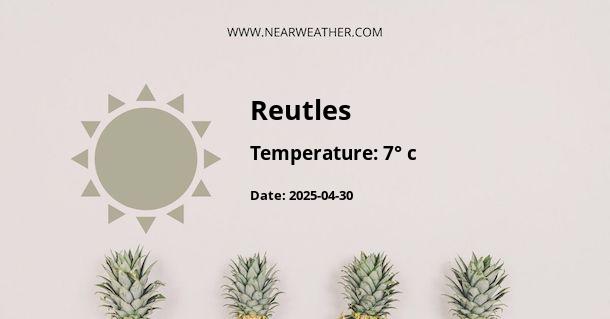Exploring the Climate and Weather of Reutlingen, Germany
Reutlingen is a city located in the southern German state of Baden-Württemberg. It sits at the foothills of the Swabian Alb, near the Black Forest, which has a significant influence on its climate. Understanding Reutlingen’s weather patterns throughout the year can be an invaluable resource for residents, visitors, agriculture, and business planning. Let’s delve into the different aspects of Reutlingen's weather and climate.
Overview of Reutlingen’s Climate Profile
The climate in Reutlingen is generally classified as oceanic (Cfb) according to the Köppen climate classification. This denotes mild to warm summers, cool winters, and precipitation fairly distributed throughout the year. Here, we will tackle a comprehensive analysis of the climate and how it unfolds month by month.
Temperature Patterns
| Month | Average High (°C) | Average Low (°C) |
|---|---|---|
| January | 3 | -2 |
| February | 5 | -1 |
| March | 9 | 1 |
| April | 14 | 4 |
| May | 18 | 8 |
| June | 22 | 12 |
| July | 24 | 14 |
| August | 24 | 14 |
| September | 19 | 10 |
| October | 14 | 6 |
| November | 7 | 2 |
| December | 4 | -1 |
Precipitation Insights
Precipitation in Reutlingen does not exhibit extreme seasonal variations, but it does have a slight peak during the summer months due to convective rainfall. Snow is common in the winter, although typically not in large amounts, contributing to the city's wintry charm.
- Spring (March - May): Spring witnesses a gradual increase in temperatures with a corresponding rise in precipitation levels. Spring can be wet, with April showers bringing the budding blooms of May flowers.
- Summer (June - August): Reutlingen enjoys a warm and pleasant summer, with occasional heatwaves. Though it is the warmest season, summer also experiences the most rainfall due to thunderstorms, especially in July and August.
- Autumn (September - November): Autumn sees a decrease in temperature and daylight. Precipitation levels dip slightly, but overcast skies may persist, leading to a typical autumnal atmosphere.
- Winter (December - February): Winter is characterized by colder temperatures and shorter days. Snowfall is common, especially in January, coating the city in a picturesque layer of snow – although Reutlingen generally avoids the extreme cold seen in more continental climates.
Seasonal Weather Events
Reutlingen experiences a range of weather events through the year which are integral to its climatic identity.
- Föhn Winds: Occasionally, the city is affected by the Föhn, a dry and warm down-slope wind from the Alps, which can significantly affect temperature and snowfall patterns.
- Thunderstorms: In the summer, Reutlingen can experience intense thunderstorms, which can cause flash floods and bring hail.
- Snow and Ice: Winters may bring beautiful snowy landscapes but also ice, which can disrupt transportation and increase risks of accidents.
Impact on Local Life and Activities
The climate and weather in Reutlingen play a critical role in determining lifestyle, tourism, and local economic activities.
- Agriculture: The mild climate allows for a diverse range of agricultural activities in the surrounding areas. Vintners, for instance, rely heavily on the climate for wine production, and the region's vineyards are dependent on the temperature and precipitation patterns for successful harvests.
- Tourism: Weather patterns influence the peak tourism seasons in Reutlingen, with visitors often preferring the pleasant climate of late spring, summer, and early autumn for exploring the natural and cultural sites.
- Outdoor Sports and Recreation: The changing seasons cater to different activities such as hiking in the Swabian Alb during warmer weather or enjoying winter sports during snowfall periods.
Historical Weather Trends
Analyzing historical weather data is crucial in recognizing long-term shifts in weather patterns due to climate change. Reutlingen, like many parts of the world, has experienced gradual changes in its average temperature and precipitation rates over the decades, underscoring the importance of sustainable practices to mitigate the impact of global warming.
Climate Change Considerations
As with many regions, Reutlingen is observing shifts in its climate profile, which can be attributed to broader climate change effects. These include more frequent and intense heatwaves, alterations in precipitation patterns, and an earlier start to the spring season. Such shifts not only affect the natural environment but also have ramifications for agriculture, water management, and urban planning within the region.
Preparation for Weather Variability
Residents and authorities in Reutlingen are accustomed to preparing for the variety of weather conditions experienced throughout the year. This includes infrastructure development resilient to both heatwaves and cold snaps, emergency services equipped to deal with severe weather events, and public education on weather preparedness. Understanding the specifics of Reutlingen’s climate and weather is thus not only a matter of curiosity but one of practical necessity.
Final Word on Reutlingen’s Weather
In conclusion, Reutlingen’s climate offers a diverse range of weather conditions that keep its residents on their toes. From warm summer days to brisk winter nights, there's a season for everyone in this charming German city. As the globe faces climate uncertainties, it will be increasingly important to monitor and adapt to the changes that come Reutlingen's way.
A - Reutles's Latitude is 49.533329 & Longitude is 11.016670.
A - Weather in Reutles is 7° today.
A - Climate Conditions in Reutles shows clear sky today.
A - Humidity in Reutles is 87% today.
A - Wind speed in Reutles is 0 km/h. today.
